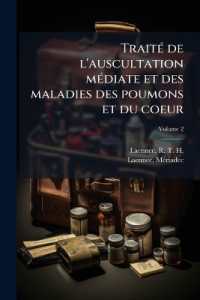- ホーム
- > 洋書
- > 英文書
- > Philosophy
Full Description
Examines the relationship of Derrida's writings on architecture to his methodology of deconstruction and to deconstrutivism in architecture.
Between 1984 and 1994 Jacques Derrida wrote and spoke a great deal about architecture both in his academic work and in connection with a number of particular building projects around the world. He engaged significantly with the work of architects such as Bernard Tschumi, Peter Eisenman, and Daniel Libeskind. Derrida conceived of architecture as an example of the kind of multidimensional writing that he had theorized in Of Grammatology, identifying a rich common ground between architecture and philosophy in relation to ideas about political community and the concept of dwelling. In this book, Francesco Vitale analyzes Derrida's writings and demonstrates how Derrida's work on this topic provides a richer understanding of his approach to deconstruction, highlighting the connections and differences between philosophical deconstruction and architectural deconstructivism.
Contents
Acknowledgments
Introduction
1. The Law of the Oikos: Jacques Derrida and the Deconstruction of the Dwelling
2. The House in Deconstruction: Notes on Derrida and the Law of the Oikos
3. Jacques Derrida and the Politics of Architecture
4. Mythographies: Toward an Architectural Writing
5. Writing Space: Between Tschumi and Derrida
6. Divergent Traces: Peter Eisenman as an Interpreter of Deconstruction
7. Spacing: The Architecture of Deconstruction
Notes
Bibliography
Name Index








